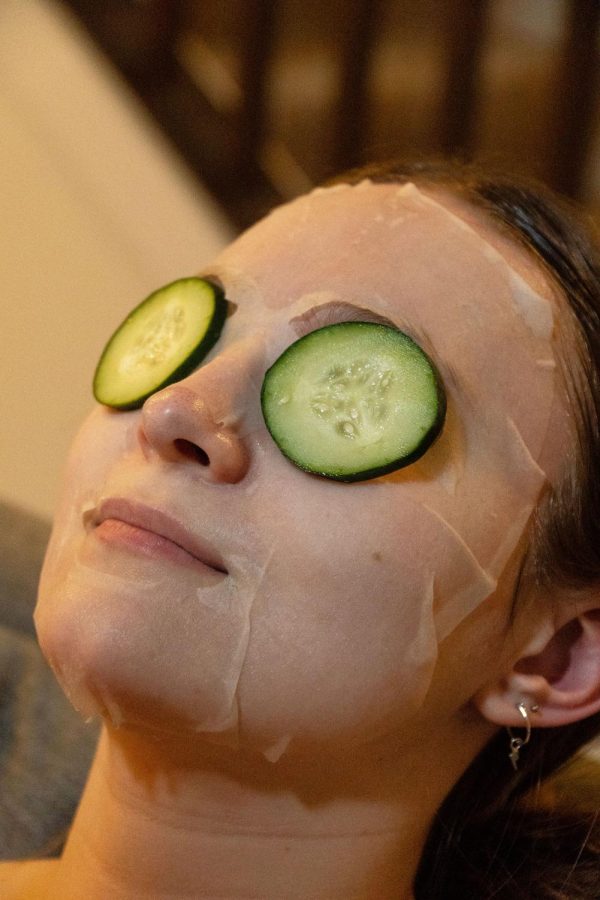The Way of Things: Healthy coping mechanisms can help students make it through the school year
Second-year psychology major Sophia Fischer relaxes while wearing a facemask and cucumbers to soothe her mind while preparing for finals week at her home on March 9. It is important for students to take time for themselves to cool off and calm down, especially during the winter months which can be dark and dreary, physically and mentally.
April 4, 2022

Editor’s Note: This column does not represent the opinion of The Daily Barometer. This column reflects the personal opinions of the writer.
As we begin another term, burnout already hangs around the corner like an old (not so good) friend, and it’s important students take time to care for themselves and each other.
I know, taking care of yourself is easier said than done, but in the long run, you’ll be glad you took the time to prioritize your wellbeing.
Personally, I find it difficult to just stop and let myself relax sometimes, but one thing that helps is consciously reminding myself that it’s okay not to be working 24/7. It’s absolutely necessary to take a few extra minutes to use that body scrub you love, or to lie down and take a nap, or do whatever relaxing activity you enjoy. Remember, self-care is healthcare.
Bonnie Hemrick, assistant director of Mental Health Promotion at Oregon State University’s Counseling and Psychological Services and interim director of Prevention and Wellness for Student Health Services, said when you’re feeling stressed, it’s important to take care of yourself by stretching, deep breathing or meditating; getting enough sleep, spending time outside; and keeping up with your nutritional needs. She said it’s also good to connect with others and talk with trusted people about how you feel.
“Seeking emotional support when you need it and helping others cope with stress can help normalize what you may be experiencing and help you and those you care about feel less alone,” Hemrick said. “If news stories are causing stress or anxiety, consider limiting yourself to checking the news just a couple of times per day and take a break from your phone, TV and computer screens when you feel these emotions coming up.”
Therapy is super helpful and important to a ton of people, and it’s a resource I highly recommend exploring. OSU even provides free mental health services to students at CAPS. There you can find short-term counseling, support groups, meditation information, medication management and more.
Janice Imel, a licensed professional counselor in Corvallis, Ore., said there are strategies to use to get through a stressful time, including asking for help and re-evaluating your expectations, but her main suggestion is breath control. She said taking deep belly breaths in a difficult moment allows you to step back from a problem or your own emotions.
“When we combine the diaphragmatic breathing with some type of positive affirmation, we can calm ourselves in the moment and allow ourselves to respond to a situation rather than react,” Imel said. “Reaction comes from emotion while responding comes from our ability to choose.”
Dr. Regan Gurung, director for the General Psychology program at OSU’s School of Psychological Science and associate vice provost and executive director for the Center for Teaching and Learning, said it’s important to try multiple methods and not to get stuck in a rut with one that doesn’t work for you.
“There’s no one magic bullet for coping,” Gurung said.
According to Gurung, making quiet time for your mind free of screens and even music, just you and nature, can be beneficial.
Positive Psychology, a science-based online platform that provides information about positive psychology, has some great information detailing even more healthy coping mechanisms, and outlines some unhealthy mechanisms to avoid as well. After all, it can be hard to recognize something isn’t good for you if you don’t know it in the first place.
Some of Positive Psychology’s recommended healthy coping mechanisms include meditation, engaging in progressive muscle relaxation, listening to music, aerobic exercise, going to the movies, reading, working on puzzles or playing games, going for a leisurely walk, relaxing in a steam room or sauna, spending time alone, socializing with friends, sitting outside and relaxing and engaging in a hobby you enjoy.
Some of my personal favorite healthy coping mechanisms are watching movies, doing a face mask, working on art projects and napping. I especially recommend art; it can be incredibly therapeutic and relaxing, and art therapy is a commonly used technique for all age groups. Art can come in many forms, be it drawing, painting, sewing, singing or tons of other options.
If you don’t have the necessary supplies to do the art you want, OSU’s Craft Center has just about everything you could need, and they even have kits to check out and take home for a variety of art forms as well as classes in stained glass, pottery, woodworking and more.
When it comes to homework overload, if you’re coming up on a deadline and you know you’re not going to be able to make it, reach out to your professor. Odds are, they’ll be flexible and give you an extension, even if it’s just a day.
I highly recommend figuring out early in the term which of your professors are flexible and which ones aren’t—sometimes it’s as simple as shooting them a quick email to ask outright if they’re willing to give you leeway when and if you need it.
Another important thing to keep in mind: get—and I cannot stress this enough—your sleep. It’s not always easy to fit sleep into a crazy schedule, but if you aren’t sleeping as much or as well as you need to, it will eventually impact your life in a lot of negative ways. If you have trouble sleeping like I have for the past decade-plus, talk to your doctor about solutions, supplements or medications that can help you get back on track.











































































































